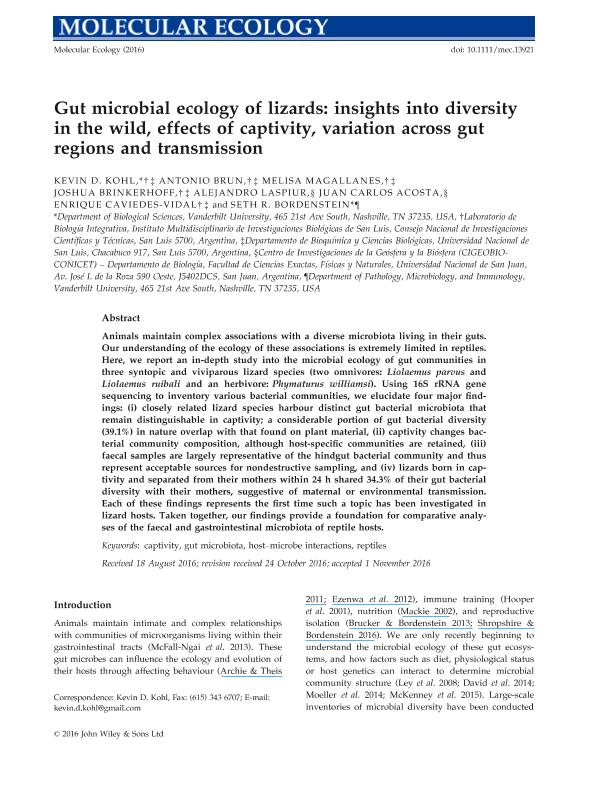Artículo
Gut microbial ecology of lizards: insights into diversity in the wild, effects of captivity, variation across gut regions and transmission
Kohl, Kevin D; Brun, Antonio ; Magallanes Alba, Melisa Eliana
; Magallanes Alba, Melisa Eliana ; Brinkerhoff, Joshua; Laspiur, Julio Alejandro
; Brinkerhoff, Joshua; Laspiur, Julio Alejandro ; Acosta, Juan Carlos; Caviedes Vidal, Enrique Juan Raul
; Acosta, Juan Carlos; Caviedes Vidal, Enrique Juan Raul ; Bordenstein, Seth R.
; Bordenstein, Seth R.
 ; Magallanes Alba, Melisa Eliana
; Magallanes Alba, Melisa Eliana ; Brinkerhoff, Joshua; Laspiur, Julio Alejandro
; Brinkerhoff, Joshua; Laspiur, Julio Alejandro ; Acosta, Juan Carlos; Caviedes Vidal, Enrique Juan Raul
; Acosta, Juan Carlos; Caviedes Vidal, Enrique Juan Raul ; Bordenstein, Seth R.
; Bordenstein, Seth R.
Fecha de publicación:
02/2017
Editorial:
Wiley Blackwell Publishing, Inc
Revista:
Molecular Ecology
ISSN:
0962-1083
Idioma:
Inglés
Tipo de recurso:
Artículo publicado
Clasificación temática:
Resumen
Animals maintain complex associations with a diverse microbiota living in their guts. Our understanding of the ecology of these associations is extremely limited in reptiles. Here, we report an in-depth study into the microbial ecology of gut communities in three syntopic and viviparous lizard species (two omnivores: Liolaemus parvus and Liolaemus ruibali and an herbivore: Phymaturus williamsi). Using 16S rRNA gene sequencing to inventory various bacterial communities, we elucidate four major findings: (i) closely related lizard species harbour distinct gut bacterial microbiota that remain distinguishable in captivity; a considerable portion of gut bacterial diversity (39.1%) in nature overlap with that found on plant material, (ii) captivity changes bacterial community composition, although host-specific communities are retained, (iii) faecal samples are largely representative of the hindgut bacterial community and thus represent acceptable sources for nondestructive sampling, and (iv) lizards born in captivity and separated from their mothers within 24 h shared 34.3% of their gut bacterial diversity with their mothers, suggestive of maternal or environmental transmission.Each of these findings represents the first time such a topic has been investigated in lizard hosts. Taken together, our findings provide a foundation for comparative analyses of the faecal and gastrointestinal microbiota of reptile hosts.
Palabras clave:
Captivity
,
Gut Microbiota
,
Host-Microbe Interactions
,
Reptiles
Archivos asociados
Licencia
Identificadores
Colecciones
Articulos(CCT - SAN JUAN)
Articulos de CENTRO CIENTIFICO TECNOLOGICO CONICET - SAN JUAN
Articulos de CENTRO CIENTIFICO TECNOLOGICO CONICET - SAN JUAN
Citación
Kohl, Kevin D; Brun, Antonio; Magallanes Alba, Melisa Eliana; Brinkerhoff, Joshua; Laspiur, Julio Alejandro; et al.; Gut microbial ecology of lizards: insights into diversity in the wild, effects of captivity, variation across gut regions and transmission; Wiley Blackwell Publishing, Inc; Molecular Ecology; 26; 4; 2-2017; 1175-1189
Compartir
Altmétricas



